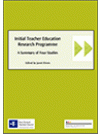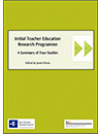Until the 1990s, New Zealand teachers completed their initial teacher education in one of a small number of specialist colleges of education. The deregulation of teacher education, the introduction of a competitive market, and changes in funding policies in the 1990s saw significant growth in the number of new providers and qualifications. By 2005, there were 27 providers offering 85 different qualifications.
Since 1996, there has been a series of reviews of initial teacher education, such as the Education and Science Parliamentary Select Committee inquiry, which indicated disquiet about the quality of initial teacher education in New Zealand. But there has been no clear evidence for the concerns, and, in particular, no national review of initial teacher education that takes into account the diversity of qualifications being offered.
National and international research shows the significant impact teachers have on the quality of teaching and learning and the correlation between initial teacher education and quality of teaching and learner achievement.
Government policies focusing on teaching quality and anecdotal evidence about quality and variability of initial teacher education have reinforced the need for systematic research to inform future policy and practice.
To meet this need, the Ministry of Education and the New Zealand Teachers Council, in 2004 and 2005, commissioned a research programme comprising four studies. With the exception of the first study, which focused on primary and secondary, the studies are of early childhood, primary and secondary initial teacher education. Together, the studies provide a comprehensive overview of the characteristics of initial teacher education in New Zealand.


